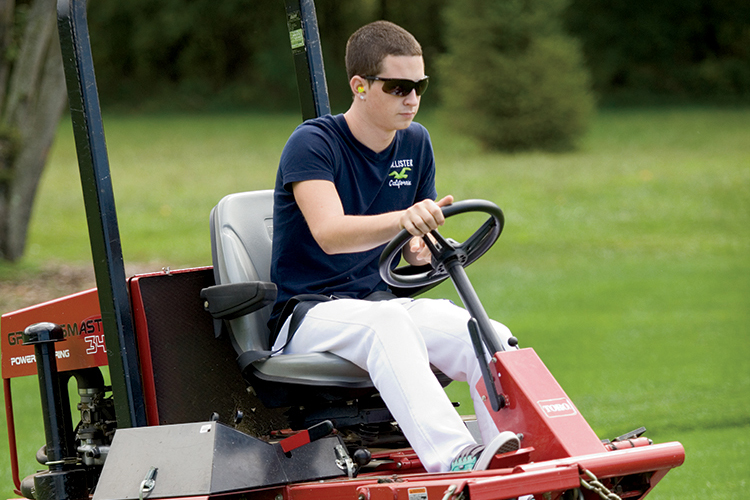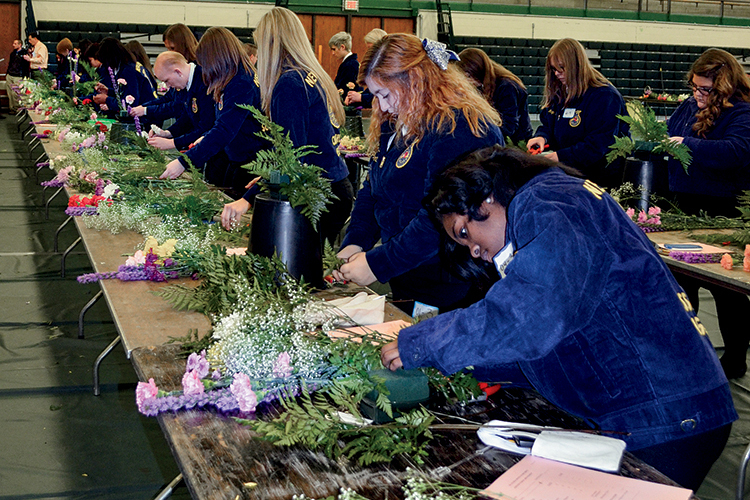Home > New Jersey > New Jersey Ag Education > New Jersey Ag Careers: Fields of Change
New Jersey Ag Careers: Fields of Change

Professionals working in the agriculture industry are as unique and diverse as the variety of fields they specialize in, but everyone agrees on one thing: It is an extraordinary time to be working in agriculture.
“The world’s population will grow from 7 billion people to more than 9 billion in the next 36 years,” says Russell Redding, dean of Agriculture and Environmental Sciences at Delaware Valley College. “During those same years, the students who are in high school and college now will be in the workforce.”
Because of the diversity in careers available to agriculture graduates, Redding says he knows the future of scientific discovery is in good hands.
Preparing For A Changing World
Agriculture isn’t just about farming anymore, says Larry Katz, director of Cooperative Extension for Rutgers University.
“Any career with a basis in science and research can begin with a degree in agriculture,” Katz says.
The wide spectrum professional fields is astounding, Katz says, and growing every day. “Our farmers are important, and they’ll continue to be important. But as our world changes, agriculture specialists are going to come from all backgrounds. And they’re going to include both the highly specialized professionals and the multidisciplinary workers.”
Katz, who teaches animal science, says Rutgers agriculture graduates and others from across the country have an incredible number of ways to get involved in the industry after receiving their degrees. These opportunities range from wildlife management, veterinary science, animal and human health specialists, dentists and chiropractors to climate-change specialists, educators, environmental consultants, oceanographers, meteorologists, landscape architects, and turf, golf course and public-land managers.
“Agriculture is a huge part of the world around us. Opportunities in this industry are only going to continue to expand,” Katz says.

Equipping Students
To prepare for these evolving career fields, agriculture colleges, including Rutgers, are beginning to focus on teaching students from a hands-on research approach, emphasizing the importance of field experience and internships.
“It opens doors to careers students would never think could be possible,” Katz says. “And it lets them decide for themselves before they enter the workforce what area they fit into best.”
Ken Keiffer is a veterinarian at Six Flags Great Adventure in Jackson. A graduate of Del Val Agriculture’s large animal medicine program, he affirmed his desire for the career after an internship at Six Flags following his freshman year in college.
“I participated in an internship under Dr. William Rives, who is now the director of the Safari Park at Six Flags Great Adventure,” Keiffer says. “It affirmed my career aspirations of becoming a zoo vet. I returned the following year for a second internship that was more hands-on and in-depth, and continued as a seasonal warden and volunteer for the following summers.”
After Keiffer graduated from veterinary school in 2008, he was offered a full-time position with the 350-acre wildlife park at Six Flags Great Adventure, which houses 1,200 animals and is home to more than 70 species.
“I use the agriculture knowledge that I gained at Del Val every day,” Keiffer says. “Everything from animal behavior, to plant and animal biology, to animal nutrition and forage quality is all relevant to the housing and care of the species we have here at Six Flags.”
All Eyes On Agriculture
Agriculture is at the intersection of many contemporary issues, Redding says, and people are talking about agriculture all over the world.
“Agriculture needs students who want to tackle the big issues of our time; in fact, society needs them,” Redding says. “Now is the time to convert all the science to practice, and for future leaders to gain the knowledge and experience they will need to be prepared to lead.”
Katz agrees and says agriculture educators are preparing students to be forward-thinkers.
“We’re preparing students for what they are going to face in their lifetimes,” Katz says. “The reality is, these are going to be issues that we’ve never faced before.”
As the definition of agriculture continues to evolve, professionals across the industry like Keiffer continue to look to their roots in ag to prepare for the future.
“Agriculture is by far one of the most promising industries we have,” Keiffer says. “You are using your knowledge for the advancement of mankind.”
Agriculture is at the intersection of many contemporary issues, Redding says, and people are talking about agriculture all over the world.



